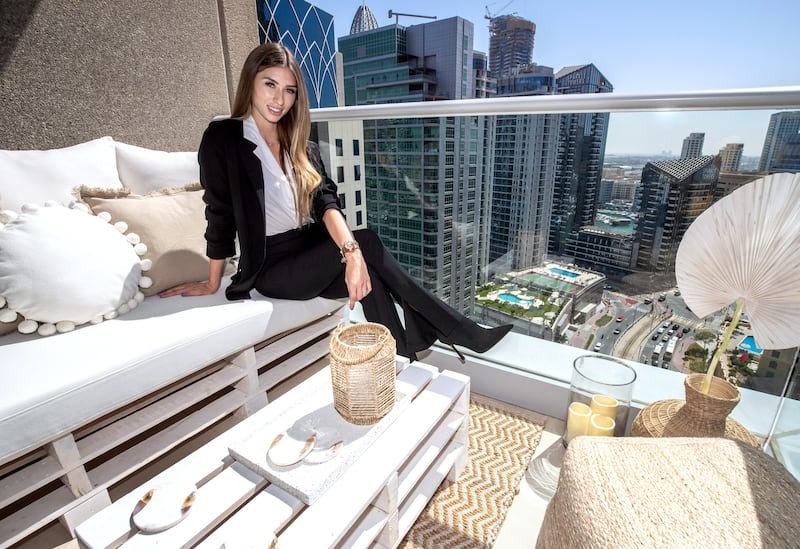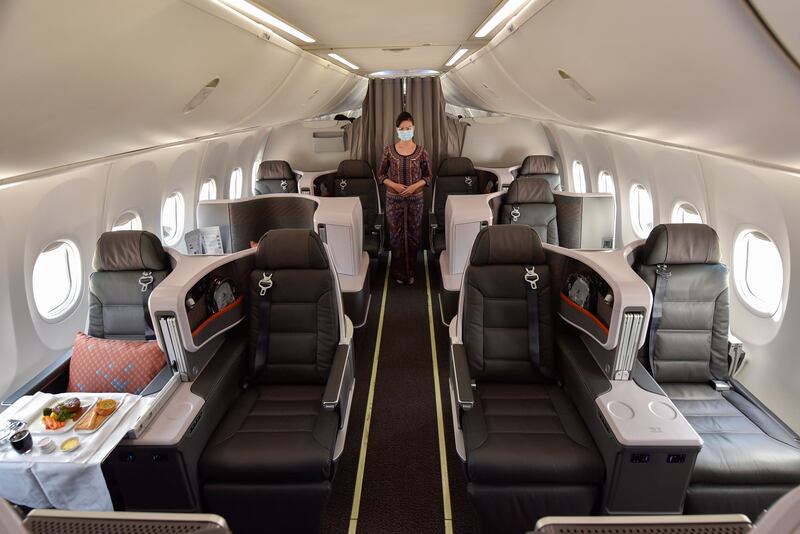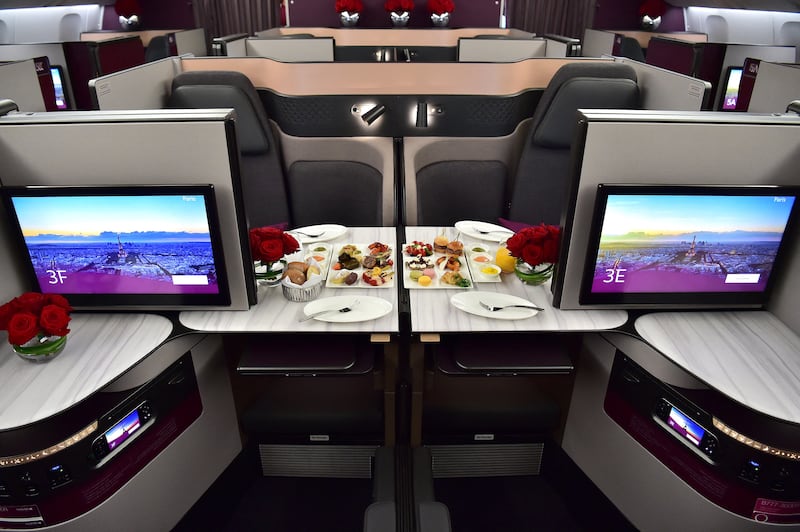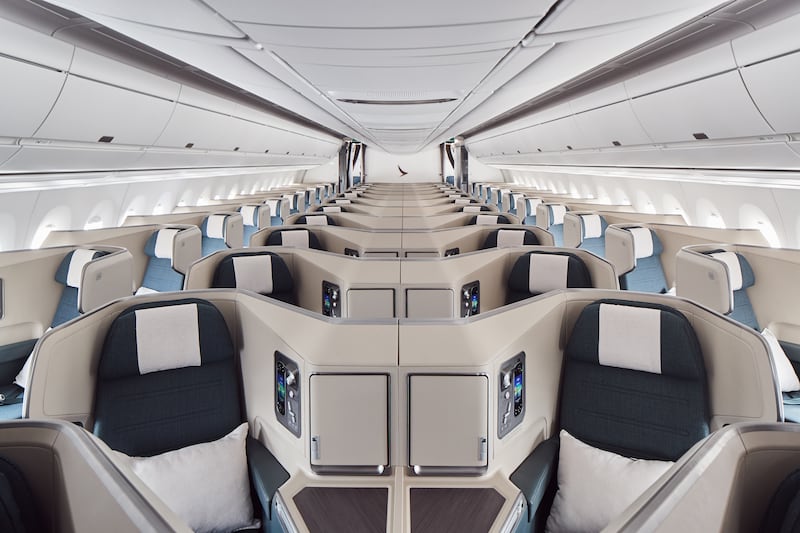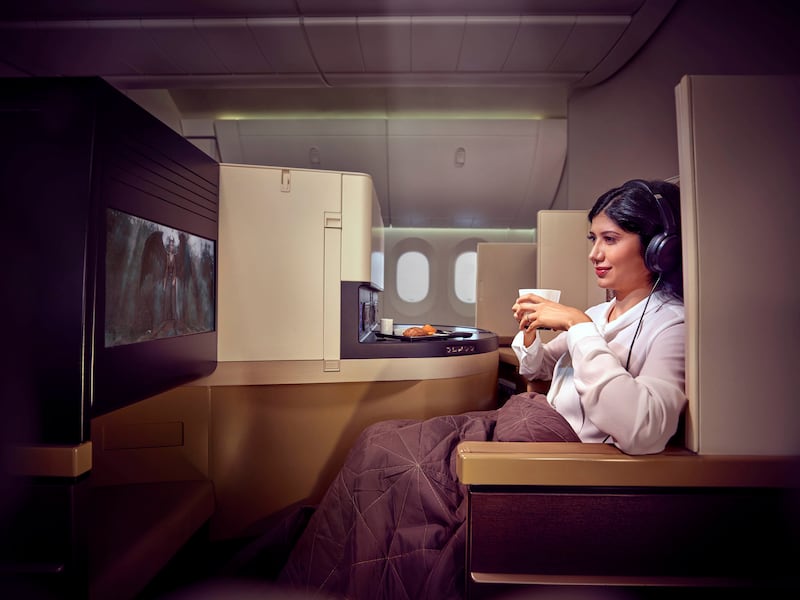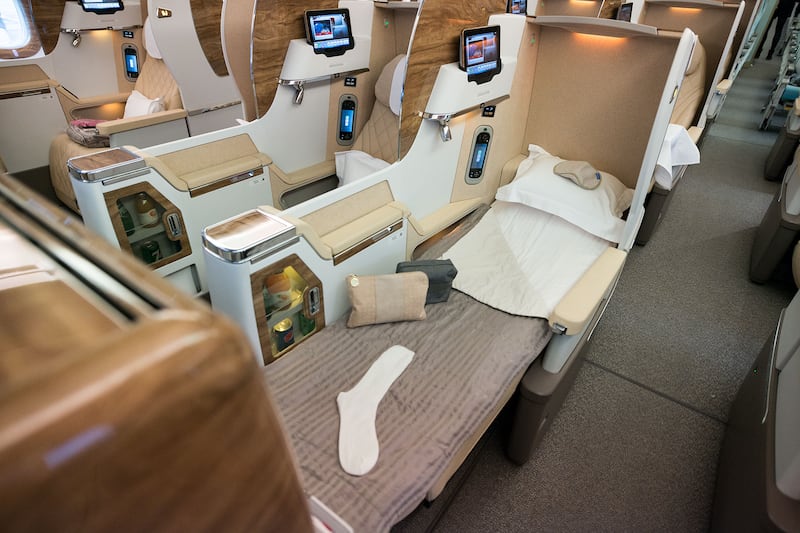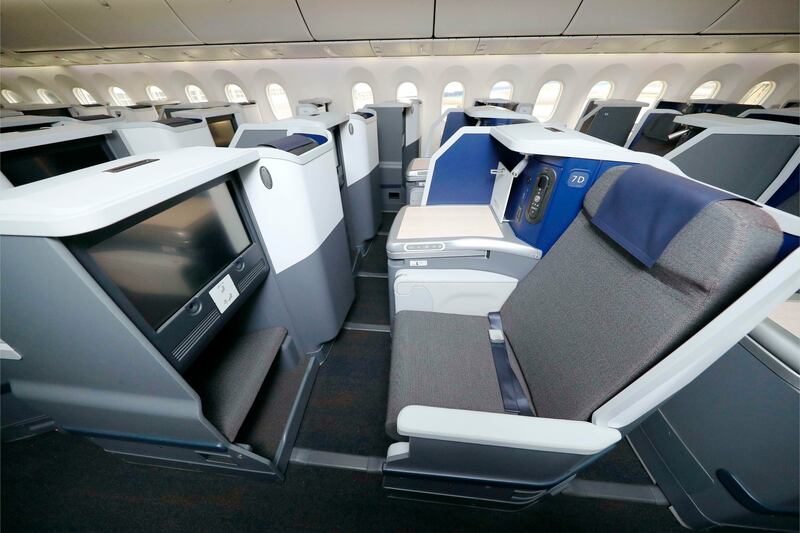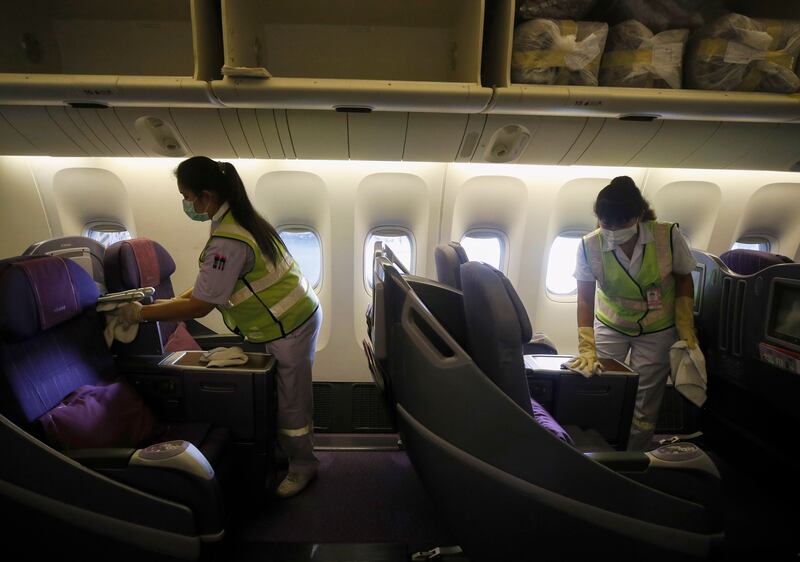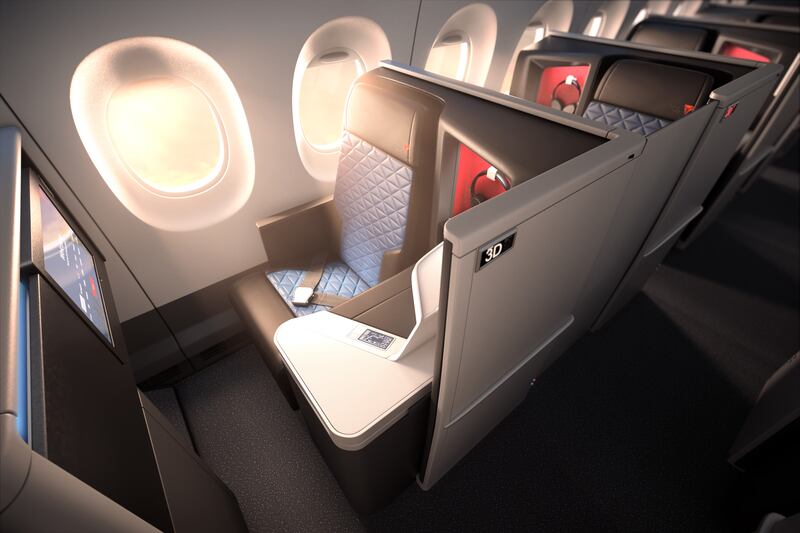When Georgina Griffin’s flying career was grounded when the Covid-19 pandemic gripped the world, she didn’t completely cease working with heights.
Like her Emirates cabin crew colleagues, the Briton observed stay-at-home mandates in the spring of 2020 — but she also discovered a new income source.
It began with Ms Griffin revamping her balcony overlooking Dubai Marina with the help of YouTube tutorials and skills she learnt at school.
“I was still with Emirates when flights were cancelled and I had all the time in the world,” she says.
“I always wanted to be involved with property and interior design as that’s where my passion is. I have the creative skills, however, I never went to university … a job within an industry like that is difficult without a degree.”
Ms Griffin sanded and painted wooden pallets, sewed cushions and, pleased with the transformation, posted photos on Instagram.
An enthusiastic response from other apartment residents led to three more balcony “passion project” makeovers for friends.
Ms Griffin then saw the potential demand, literally, while passing through Dubai Marina.
“My phone was going off with constant notifications … I looked up and could see hundreds of high-rise buildings around me and millions of balconies.
“I had the feeling this could really be something; also, there was no one else at that time doing anything similar — I knew it was now or never to try to make it work.”
Within weeks of Bespoke Balconies DXB launching, Ms Griffin, 30, was let go from Emirates as part of cuts by airlines globally amid the coronavirus crisis, but she was already en route to a new career and mitigating financial risk.
BEST BUSINESS CLASS AIRLINES IN THE WORLD — IN PICTURES
“I was taking 100 per cent upfront, so whoever ordered a balcony design would pay material costs, then I just got straight to work,” she says.
“The licence is a large amount of money for someone with a small start-up; my husband could see the potential, so he helped to make the payment, which the company returned and it can now pay for its own licence.”
Up to now, Bespoke Balconies DXB has transformed about 300 balconies across Dubai and Abu Dhabi, as well as gardens, interiors, terraces and offices.
Ms Griffin, who joined Emirates at the age of 21, isn’t the only cabin employee who has left the airline, but she is arguably one of the best known among those who found a happy landing by making ends meet through a new business venture.
Some have launched clothes lines, bikini ranges, candle brands or sell art.
Nadine Gauder, 35, an Australian who was with Emirates airline for 12 years, runs e-commerce brand Ihala, supplying sustainably packed hair, beauty and personal care products.
The venture also emerged during the 2020 stay-at-home restrictions, partly driven by frustration at excessive packaging being used in a booming online retail sector.
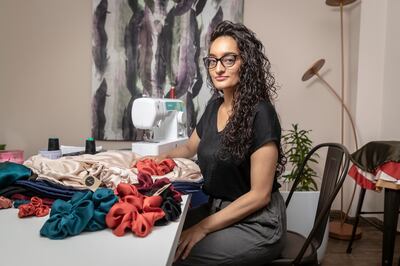
“I started getting into the natural hair movement and making things at home, accessories, just for me,” says the former cabin supervisor.
“It started from me making one item and saying I could package this in a really pretty way without covering it in plastic three times.”
Ms Gauder found traction on Instagram and worked on Ihala initially as a side hustle while still flying. Although the business began without the intention of quitting her Emirates job, she reveals Covid-19 uncertainty and the lockdown opportunity prompted her to leave this year.
“Sometimes, the world shows you reasons for things to happen and I just thought it was time to move on,” she says.
“I’d taken what I could from that role, there was nothing more that I needed to experience … it was great, but it wasn’t forever. I didn’t plan that Ihala was going to take over from flying, but I was happy to see where it would go.”
Beginning modestly at her home in Business Bay, Ms Gauder didn’t incur significant costs that would render her venture vulnerable in its earliest stages.
“I didn’t really have a budget — it started at my kitchen table with a couple of hundred dollars,” she says.
“I bought a sewing machine, started getting into sewing, which I hadn’t done since I was a teenager, started adding a few more products and it turned into Ihala.”
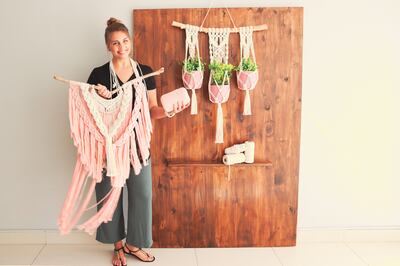
Former Emirates business class crew Anicia Van Zyl also experienced similar organic growth.
Her “lockdown hobby” at home in Dubai’s Motor City became such a passion she progressed to create Living Space by Anna to market her output.
“We were in the middle of renovating our new home and buying non-essentials or shopping around for home decor items wasn’t really an option at the time due to strict Covid-19 measures,” she says.
“I was looking to decorate our balcony with plants but did not find exactly what I was looking for — my friend gave me some leftover rope from crochet projects and that was a beginning of my new hobby.”
After watching many YouTube videos, the South African made her first plant hanger before exploring wall tapestry art.
Friends then requested pieces for their homes, leading to suggestions to sell her work. In 2021 she built a website and social media presence.
“It became such a great venture I decided to resign from flying after seven-and-a-half years to pursue my passion for macramé art,” Ms Van Zyl, 33, says.
Emirates aims to return to 100% of pre-pandemic operations and network capacity in 2023
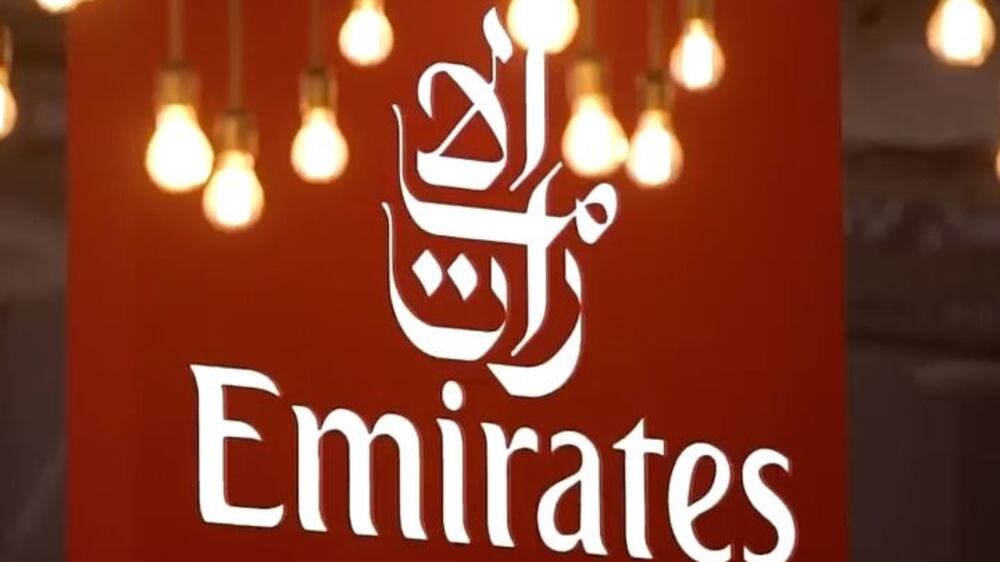
“Leaving is hard … it’s an incredible job and opportunity to explore the world [and] not having a stable income is scary, but it was definitely encouragement to work hard and put in the efforts to make my small business work.
“I experienced a massive income drop and it will take months, maybe years, to fully overcome, but amazing support from my husband, family and friends really encouraged me to take this step.”
While Ms Van Zyl’s employment shift was calculated, Ms Griffin says losing her job initially brought panic.
“At that time, I wasn’t making any profit from balconies as it was literally a hobby,” she adds.
“I remember searching online for jobs and everywhere needed a degree for the roles I was wanting, so I was looking into online courses.
“Alongside all this, Bespoke Balconies started getting busier and so the whole idea of it being a potential business where I could make a living was something I really wanted to make happen.”
It swiftly evolved from materials preparation at home, handling social media responses, consultations, quotes and supplies shopping as a hobby to becoming a fully fledged business with a team of stylists and back office staff.
The company is now exploring potential real estate company partnerships and the team structure allows Ms Griffin greater flexibility, although she admits the hours she commits are “definitely much more than my life as cabin crew”.
She has several friends who also left the airline and they have since embraced new roles.
“Whether it be working for another company in an industry they love, or their own business … it’s amazing to see someone you know start with an idea, then make it into something.”
Ms Gauder agrees, but reflects on the daunting prospect of switching from long-term employment and the comfort of a regular salary.
“To go and do anything on your own … it is a leap of faith, but it’s now or never. If you don’t try it, you never know,” she says. “All you can do is work hard, try your best and get out there as much as you can.”
For now, Ihala remains nimble enough for Ms Gauder to test different products without risking a major loss. It has been trading sufficiently to make an income, although she admits she may have to supplement it.
However, moving the business “quite purposefully” by not hiring external talent — photographers, web designers, social media strategists — has its pros and cons.
“I’ve had to learn how to build my website, integrate my payment gateway, do licensing and packaging … it’s given me a good grounding and I understand how everything works,” Ms Gauder says, while suggesting that might change going forward.
“It’s worked so far, but I can’t have it running on my dining room table forever,” she adds.
“I probably could have scaled faster and made more money, but I’m glad I did it this way because I had never run my own business before.”
Ms Griffin “genuinely loved” her seven years with Emirates and says she never thought about leaving, although now views it as “such a blessing”.
“I probably would have seen the potential and the opportunity with Bespoke Balconies, then I would have chosen to leave anyway, so I think everything happened for a reason and all at the right time,” she adds.
The pandemic taught many of us that money can’t buy time, Ms Van Zyl says.
“It’s wonderful when you can indulge in a lifestyle without having to think about your spending, but more rewarding is when you can spend time with loved ones and attend special occasions you normally would have missed because you’re on the other side of the world,” she says.
“Yes, I have to count my pennies and work on a budget, but the freedom of working at my own pace has definitely made it worthwhile.”
